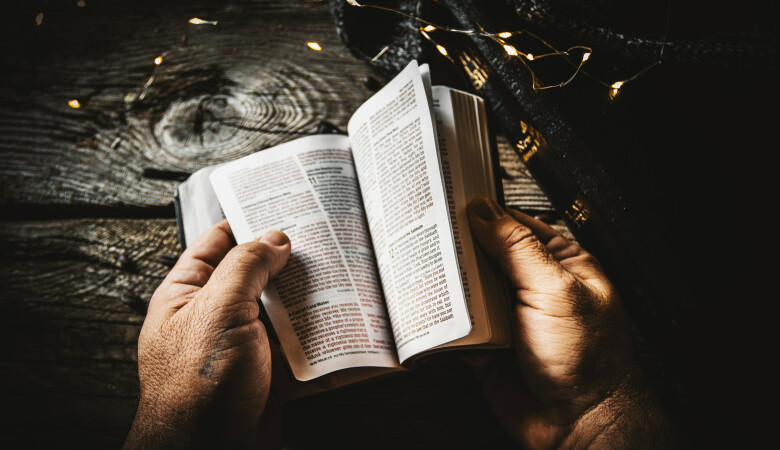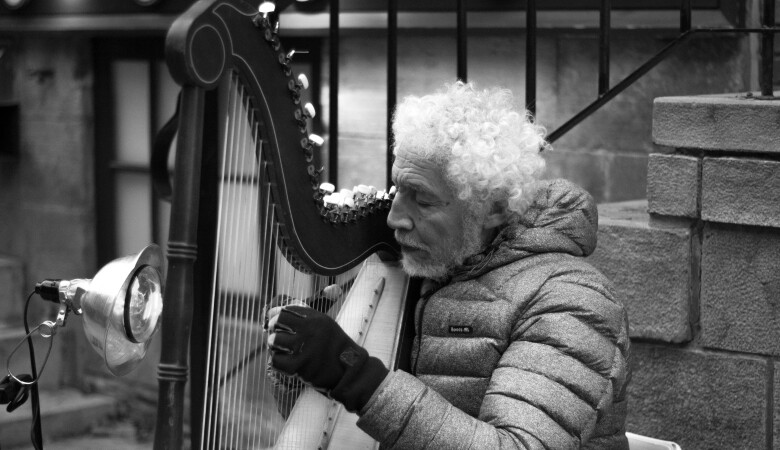The Person and Purpose of Jesus Christ (Matthew Sermon 1 of 151)
December 20, 1998 | Andy Davis
Matthew 1:1-25
Bible Prophecy, The Birth of Christ
Pastor Andy Davis preaches an expository sermon on Matthew 1. The main subject of the sermon is Jesus' entrance into the world.
- SERMON TRANSCRIPT -
I. Christmas confusion leads to the asking of many questions
Turn your Bibles to Matthew chapter 1. I am going to begin a new series this week in Matthew's gospel, appropriately with Matthew chapter 1, Matthew's record of the entrance of Jesus Christ into the world. I've really come to appreciate Christmas in America all the more having lived overseas for two years. It is really hard to explain just how warm it makes us feel in our heart to be here in our native land when we spent two years in Japan, which is not a Christian country. Less than 1% of the population are Christians, but what amazed me in Tokushima, where we lived, was how they would put on Christmas anyway even though they didn't believe in Jesus. All the malls and the streets would be filled with the same kind of decorations that we see in America. And even more amazing would be when you would walk through the mall in Tokushima and you would hear Amy Grant playing, and they are singing songs and all this kind of thing. And I realized that nobody who is shopping there except us know what the words mean. And I thought, "This is really something." And I thought also a little bit about my own country, and I thought, that may be where we head if we do not really understand what the true meaning is of Christmas. We would have all the outside, the trapping, the shell but without the glowing center, the heart, the center of Christmas.
And I think in order to get at that, you need to ask what the right questions are. Christmas really is a time of questions. I remember when I was a child, I would lay in bed and ask questions like, "What is in that box that I've seen the last week or so under the tree?" Do you ever have one of those kind of questions? "What am I going to get for Christmas?" Or perhaps another question by fathers and mothers: "How in the world am I going to pay my Visa bill in January?" That is a more significant question. But neither of those questions leads to the heart of Christmas. I think we already sang two questions, however that will. Maybe it'll sound familiar to you. How about this one? What child is this, who laid to rest on Mary's lap is sleeping? That is a question of identity, isn't it? Who is this baby? Question of who? In the second verse of that same hymn, how about this one: "Why, why lies He in such mean estate where ox and ass are feeding? That is a question of purpose. Question of identity, question of purpose. And it is exactly that that Matthew seeks to address here in Matthew chapter 1, and he does it with the genealogy and with an account, a simple account of Joseph and Mary.
Now, in terms of the genealogy and all the prophecies that came about, the whole purpose of that was that there be no case of mistaken identity. How many of you get the Herald Sun? How many of you really read the religion page in the Herald Sun? How many of you know where I'm going with this?
There's a little article in here. I wasn't here last week because I received my PhD at Southern Seminary, and it is a very nice article. There is nothing wrong with the article. I enjoyed the article, very brief, about how I got my PhD. What was interesting to me though is the picture in it, picture of a man who is about 75 years old, bald with glasses, and it says Davis under it. Now, people ask me if I had misplaced my hair piece. I did not misplace that and I do not wear glasses, not yet. But I thought this is really kind of funny. A case of mistaken identity. My daughter Jenny, we showed it and she looked at it and puzzled over it, and she said, "Dad, you don't look like you usually do."
I said, "That's true" but it really doesn't matter much whether they know what the pastor at First Baptist Church Durham looks like, but it matters very much whether we identify the Messiah sent from God correctly. And so that purpose is really essential to what we're getting at here this morning. Who was Jesus Christ and what was His purpose?
II. The Ancestry of Jesus
Now I am going to read Matthew 1 in its entirety. I am going to read through the genealogy, and I am going to try to explain some things to you. Now, you as Americans, perhaps do not cherish genealogy the way a Jew in the First Century would. But this was very important to the identification of Jesus Christ, so listen to it.
Chapter 1 verse 1, "A record of the genealogy of Jesus Christ, the son of David, the son of Abraham: Abraham was the father of Isaac, Isaac the father of Jacob, Jacob the father of Judah and his brothers, Judah the father of Perez and Zerah whose mother by Tamar, Perez the father of Hezron, Hezron the father of Ram. Ram the father of Amminadab, Amminadab the father of Nahshon, Nahshon the father of Salmon, Salmon the father of Boaz whose mother was Rahab, Boaz the father of Obed whose mother was Ruth, Obed the father of Jesse, and Jesse the father of King David, David was the father of Solomon whose mother had been Uriah's wife, Solomon the father of Rehoboam, Rehoboam the father of Abijah, Abijah the father of Asa, Asa the father of Jehoshaphat, Jehoshaphat the father of Joram, Joram the father of Uzziah, Uzziah the father of Jotham, Jotham the father of Ahaz, Ahaz the father of Hezekiah, Hezekiah the father of Manasseh, Manasseh the father of Amon, Amon the father of Josiah, and Josiah the father of Jeconiah and his brothers at the time of the exile to Babylon".
"After the exile to Babylon, Jeconiah was the father of Shealtiel, Shealtiel the father of Zerubbabel, Zerubbabel the father of Abiud, Abiud the father of Eliakim, Eliakim the father of Azor, Azor the father of Zadok, Zadok the father of Akim, Akim the father of Eliud, Eliud the father of Eleazar, Eleazar the father of Matthan, Matthan the father of Jacob, and Jacob the father of Joseph, the husband of Mary of whom was born Jesus who is called Christ. Thus there are 14 generations in all from Abraham to David, 14 from David to the exile to Babylon, and 14 from the exile to the Christ”.
“This is how the birth of Jesus Christ came about. His mother Mary was pledged to be married to Joseph, but before they came together, she was found to be with child by the Holy Spirit. Because Joseph her husband was a righteous man and did not want to expose her to public disgrace, he had in mind to divorce her quietly. But after he had considered this, an angel of the Lord appeared to him in a dream and said, "Joseph, son of David, do not be afraid to take Mary home as your wife, because what is conceived in her is from the Holy Spirit. She will give birth to a son, and you are to give him the name Jesus, because he will save his people from their sins. All this took place to fulfill what the Lord had said through the prophet: ‘The virgin will be with child and will give birth to a son and they will call him Immanuel’ -which means, ‘God with us.’ When Joseph woke up, he did what the angel of the Lord had commanded him and took Mary home as his wife. But he had no union with her until after she gave birth to a son and he gave him the name Jesus."
Now it is easy for us, I think, to skip the genealogy and go right on to the account of Joseph and Mary. I think probably that is part of American history. A lot of us left, or our ancestors left, the old world and left an old way of life behind and didn't really want to bring that genealogy and that history over with them. Some of that heritage was lost at places like Ellis Island where I know my ancestors’ names were misspelled and it is really hard to trace it beyond that.
But in the First Century, Jews were very desirous to show their descent from Abraham, and a certain house and lineage was especially concerned to trace their descent from a certain king named David. And so, the genealogy would have been memorized and recited by young Jewish boys and girls and they would learn their heritage that way, and it was very important to them. But it was especially important for David's descendants, because God had made some promises that He was going to be faithful to. And those promises point to and identify ultimately, the Messiah. Now, it is fascinating to go through all of the twists and turns of genealogy, but we do not have time for that this morning. What I would like to do instead is draw out a couple of principles, some key themes, which this genealogy points to, which center on the person of God, what kind of God He is. The first is God's faithfulness, the second, God's patience, and the third, God's grace.
God’s Faithfulness
Now faithfulness is the ability to maintain faith to a promise that you made. In other words, you are going to make a promise and you are going to keep that promise, no matter what. Now, we make promises, some of them we keep, we should keep all of them, but you see, God is not that way. When God makes a promise, he absolutely keeps it every time. Now, in this genealogy, right in the very first verse, there is indication of some of those promises that God made. It says, "The record of the genealogy of Jesus Christ, the son of David, the son of Abraham". Now, it is fascinating this way, if you look back in Genesis chapter 12, you don't have to turn there, but God made a promise in Genesis 12 to Abraham. And he promised Abraham that through Him, through His offspring, all nations on earth would be blessed. It was a promise or a prophecy of the coming Messiah. Archeology tells us that Abraham probably lived around 2000 years before Jesus was born. 2000 years. Now it is astonishing to think of God's faithfulness, to keep a promise and remember a promise 2000 years later. Some number of years after that, along came a man named King David. And David, having a heart after God's own heart, wanted to build a house for God, a place of worship, called a temple.
"When God makes a promise, he absolutely keeps it every time. "
And God through the prophet Nathan told him that he was not the one who would build a house for God, but God said, "I will build a house for you. I will establish your throne and your lineage, and I will raise up a son from your own body and ultimately one of your descendants will sit on your throne forever and ever." Another promise made. This genealogy shows God's faithfulness to both of those promises over 2000 years and more.
God’s Patience
But it also shows God's patience and just in mentioning 2000 years, you can see the patience of God. Oh, by the way, it has been 2000 years since Christ was born. I am not making any promises about the second coming. Any of you who know me know that I am not going to do that, however popular or spectacular it would be. But God is a patient God. It has been 4000 years since he made that promise to Abraham and he still remembers it. And that promise is being worked out all over the world, even today. The lights on the Lottie Moon wreath and the advance of the gospel point to faithfulness of God to that promise, and God's incredible patience in waiting to fulfill it. You see, it says in Galatians Chapter 4, verse 4, "When the time had fully come (or in the fullness of time or at just the right time,) God sent His son, born of a woman, born under the law." God was waiting for just that right time when the whole world was at peace under the Roman Empire, unified under that one form of government and when Caesar Augustus issued a certain decree that a census should be taken “just at the right time, God sent his Son”. The patience of God, it is incredible.
God’s Grace
But more than anything through this genealogy, I see the grace of God. Now, what is the grace of God, but God's kindness and lavish blessing to wicked sinners like us? It's interesting, I come from a Catholic background, and in the Catholic faith, there is a certain dogma called the doctrine of the immaculate conception. Now, you may not know anything about this, but it has nothing to do directly with the birth of Jesus Christ from a virgin. It has to do with the fact that Mary or the idea that Mary, the mother of Jesus, was protected from sin in her mother's womb.
Now, the reason that that Catholic church does this, is they feel the need to have a kind of a pure lineage coming down to Jesus, so that He is protected from sin. But if you look at Matthew's account, you are not going to find purity anywhere. All these people are sinners, and some of them are notorious and wretched sinners. It's incredible the grace of God as you look through it. David, who was a man after God's own heart, was also of course, an adulterer and a murderer and his son Solomon, one of the greatest idolaters in Israel's history. Rehoboam, his son, was an arrogant boaster. I could go right down through the line right here. The worst of them all was Manasseh in verse 10. Any of you who know Old Testament history know about this guy. Manasseh introduced all kinds of new religions to Judah, worshipped idols, filled Jerusalem with the blood of innocent men and women. And then, to top it all off, took his own son and sacrificed him to an idol, and he is right here in verse 10, in the lineage of David.
There is no protection of Jesus from sin in this way. Protection comes in another way because he is God's Son but not through the protection of the genealogy. This is an evidence of God's grace. What is even more fascinating though, is to look at the women who are mentioned in here. There are four mentioned. Four women mentioned before Mary. Actually, five total with Mary, but four in the descendants before that.
The first in verse 3 was Tamar. Now Tamar was Judah's daughter-in-law. Judah's son married Tamar. He died. They had no children and so he gave another son and he died and she still had no children. She was getting frustrated. She had no children. Judah wouldn't give the third son to her, and so she dressed up like a shrine prostitute and stood by the road. Judah, one day, who was bereft of his wife, he was a widower, walked by, didn't recognize her and had illicit relations with her, and Jesus' ancestor comes from that relationship. Actually, she had twins, Perez and Zerah and Perez is in the lineage right here. Kind of scandalous, isn't it? Shameful. Well how about Rahab, the prostitute? We know about her. She was a Canaanite woman and she was running a brothel. I guess that is the best way to put it, and two spies from Israel came in to spy out the land before Joshua crossed the Jordan River, and her soul was saved when she believed the God of Israel, took these men in, protected them and showed her faith. Ultimately, she was the only one from her whole city, she and her family, saved and they were just adopted or taken in to Israel. And the book of James lifts her up and her faith up as an example of justification by faith. So again, a scandalous woman in this family tree of Jesus.
Then in verse 5, you've got Ruth. Now Ruth was a godly woman. She really was, but she was a Moabite. Now the Moabites have a very interesting heritage themselves. Moab. The word Moab means 'from father'. And the whole story, if you trace it back comes after Sodom and Gomorrah were destroyed. Lot was in a cave with his two daughters. They thought, I think, that they were the only people left on Earth, that it had been like another flood. They thought the human race was going to be destroyed and so, they got their father drunk and they had children by him. We got the Ammonites and the Moabites from them. Both of them excluded from entrance into Israel down to the 10th generation. Well, here is Ruth. The Moabite is coming on in to Jesus' genealogy. Scandalous, it is really remarkable. And then of course, there is an unnamed woman. We don't know her name, or do we? Uriah's wife. We do know her name. Her name is Bathsheba. Okay, we know about David's adulterous relationship.
Do you see the scandal, and do you see the grace of God? Grace of God to sinners, just like you and me. And then in verses 13-15, grace of God to a bunch of nobodies. Do you know any of these people? They are right here. They made the Bible, but I do not know anything about them. I don't know if you do. I think it is exciting to make it into the Bible, but I don't know anything about these people. It's just a series of just regular people, just like you and me, after the exile to Babylon. The grace of God to sinners and to nobodies, people just like you and me. Now in all of this, this genealogy, you have to understand what Matthew is trying to do. He is pointing to the faithfulness and the patience and the grace of God but he is also identifying Jesus Christ because Joseph was a descendant from David. Joseph was presenting, in effect, when he agreed to marry Mary, presenting his name as a descendant of David to this baby who he would adopt, Jesus Christ.
Now many of you who are Bible scholars, I talked to one recently, know that there are two genealogies for Jesus Christ. There is one also in Luke. Now if you have ever taken the time to compare the two, you see there is a great deal of discontinuity. As a matter of fact, there is no similarity after David. Well that is easily explained. Many scholars believe and I do not see any reason not to believe this, that the genealogy in Luke was Mary's genealogy. The physical descent, right down to Jesus and the one in Matthew was the kingly descent. What is fascinating about all of this and this is something I did not realize until last week, is that there was a certain king, he is mentioned in verse 11. His name was Jeconiah, he is also mentioned in verse 12, who was particularly wicked and God was so frustrated with him that you know what He said to him? He said, "I am going to curse you and all of your descendants and none of your descendants is going to sit on the throne of David." God cut the line of David at that point. If you are physically descended from Jeconiah, you will not sit on the throne. Now, how in the world is God going to reconcile that to his promise to David to raise up a king? Well, the physical lineage came down through Mary on that side. The kingly lineage came down through Joseph. But you see, Joseph was not physically related to Jesus. Do you see how only Jesus could fulfill these two geologies and bring them together in perfect fulfillment? The precision of God to identify Jesus Christ as His only begotten Son, so that we would make no mistakes like was made in the Herald Sun yesterday. No mistakes, we know who it is and we can recognize it. And so Joseph made that contribution to Jesus.
III. The Birth of Jesus Christ from Joseph’s View: (vs. 18-25)
Now in verses 18 through 25, we get an account of the birth of Jesus in narrative form. And I think what is remarkable about this is how simple it is. Do you know that many mythologies have stories of gods having relations with humans and having children by them? The Greeks have them, the Romans, the Norse, all of them. But they all elaborate and explain it a great deal. This just says it in a few words, that Mary was found to be with child by the Holy Spirit. That is all it says. It does not elaborate here at all. It is a simple account. Because Mary and Joseph were simple people, just like you and me. Now we read more about Mary in Luke's gospel. She was a godly Jewish woman. She was obedient to God, she was submissive, she was faith-filled, and most of all she was a virgin, willing to give her body to the service of God and willing to stand under the reproach and the potential disgrace that that would bring. That was Mary. Joseph was, according to the text here, a righteous man. That means he was obedient to the Law of Moses. And we find out later in Matthew's gospel, was... I guess you could translate the word carpenter, a manual laborer, somebody who had perhaps skills as a mason. The ability to build a foundation of the house and build it up. But a manual laborer, a simple man. Certainly no one ready to sit on the throne of David, even though he was a son of David. Now they probably were quite young, in their teens, if their marriage was anything like other Jewish marriages at the time. Young people with an immense responsibility put on them. Teenagers, probably.
Now, a Jewish marriage was a two-step process. It began with a betrothal in which the families of the bride and groom would come together and there would be an arrangement, a contract drawn up. The bride price would be paid by the family of the groom. It was money, it was given somewhat of a guarantee to ensure his faithfulness to that contract. And the rules were very strict. They were seen by the community as being married, although they did not have relations as husband and wife for that year; it was usually a full year before the wedding ceremony. And so if there were sexual infidelity during that time, it was an act of adultery. And under the Law of Moses it was punishable by death. And so Joseph came into that contract with this godly woman, Mary. He was excited about her, I'm sure, just like any young bridegroom would be because she was an extraordinary woman. But then came some news one day. We do not have any account of the conversation between Joseph and Mary, but Mary must have come and said what the Angel Gabriel told her, and that she was pregnant by the Holy Spirit. Did Joseph believe her? No, he didn't believe her. Because he resolved to divorce her.
But he couldn't reconcile it with what he knew to be her godly character. And I am sure he must have wrestled over that decision trying to find what to do. Thinking about it. Can you imagine, put yourself in Joseph's position, what would you have done? Never in all history has there been a virgin birth. And yes, there is a prophecy, but you didn't understand that and you are working it through, and how difficult, and here is Mary. And what are you going to do? Now around that time, the Law of Moses had fallen into somewhat disrepair. It was like a garden that needed weeding. And so I don't think Mary's life per se was in jeopardy; like she was going to be stoned for adultery. Usually, there was one of two ways of handling something like this, either there would be a public rejection of Mary, a divorce proceeding in which he would take a step away from her, turn his back on her, and she would be left alone with her shame. And it's his way of saying, "I didn't do it. It's not my child." He could protect himself, you see? Or he could divorce her quietly. But either way, he had to put her aside as far as he could see. That was Joseph's solution: A quiet divorce.
And because he was a godly man and did not want to expose her to public disgrace, he chose what you could call the road less traveled. He decided to go the quiet way and pull away. So that would have left some question about Joseph. But he could not marry her, not in good conscience, if she had committed adultery. Well, God's solution was very different from that, wasn't it? God sent an angel to Joseph in a dream. Now I don't know how that worked. How does an angel come to you in a dream? Think about that. I know how an angel might come to you, but how does he come in a dream? Perhaps the angel brought the dream; put Joseph into a deep sleep and then communicated into Joseph's mind the message that God had sent. "Do not be afraid, Joseph, son of David, to take Mary home as your wife, because what is conceived in her is from the Holy Spirit. She will give birth to a son, and you are to give him the name Jesus because He will save his people from their sins." And so the message came into his mind. It was a message of fearless obedience. Do not be afraid to marry this woman.
Now he could have been afraid in that the wrath of the judgement of God would come on him for breaking the Law of Moses. But the angel was saying, in effect, Mary did not break the Law of Moses and so you would not sin to marry her. Or he could be saying... The angel could be saying, "Don't be afraid of all the societal rejection. But do God's will anyway. Be bold and be obedient, and take this woman to be your wife." And it is so beautiful to see the godly character of Joseph. He was willing to pay the price, to go under all that secret whispering. And, you know, I think forever, people have been counting months if there is an early child that's born in a marriage. Seven months, eight months, they can calculate. There are some questions here. And Joseph was willing to stand next to Mary and have those questions asked. The people would not believe, they would not understand. But he stood next to her and he protected her and cared for her because he was a godly man.
IV. The Virgin Birth and the Meaning of the Names
In all of this, we see the godliness of Joseph, we see his kindheartedness, we see Mary's obedience. But what is the significance? So what? This is an interesting story, but what does it mean to me today? I think the real significance to this entire story, at least in this account in Matthew, you are going to find in the names of Jesus. Now just as we Americans do not care that much about genealogies, we also do not put much effort into names. Now perhaps some of you go out and buy name books when you are going to name a baby. And you find out what the name means, and maybe you like it and maybe you don't. But for us, the significance of a name is not as important as how it sounds, perhaps with the middle and the last name. Or if there is a relative by that name that we want to honor. But back in those days, those names meant something. There are three names in this account. There is the name of prophecy: Christ, the name of prophecy. There is Jesus, the name of purpose, and there is Immanuel, the name of personal identity.
Now, if we look at these three names together, they all point to the identity of Jesus Christ, and they point to the virgin birth. The virgin birth 100 years ago or more began to be openly questioned as we got more and more scientific, as we got more and more advanced. We said, "We want a faith, we want a Christianity that resonates with what we are learning in the scientific world, and we know it is impossible to have a baby without having a human father. So it is impossible to have a virgin birth, so we are going to call that an early Christian myth, and we are going to demythologize our faith. We are going to strip out what is truly significant from what is just that early myth. You see, they were simple people and they could believe something like this, but we are advanced, we are complicated, we know that something like this could never happen."
And so, the virgin birth came under attack, but the virgin birth, without question, is predicted in Scripture, it is fulfilled in Scripture, it is explained and it is required by Scripture. It is predicted in Isaiah 7:14, when it says, "The virgin will be with child and give birth to a son, and they will call him Immanuel." Do you know when that prophecy was given? It was given 650 some odd years before Jesus was born. 600 years before the birth of Christ, that there would be a virgin birth. There is no getting around it, it was predicted long before He came. The virgin birth, however, was also fulfilled. Right here in verse 18, look at it, it says, "Before they came together, she was found to be with child through the Holy Spirit." That is the virgin birth. And also in Luke's gospel, it said very plainly that Mary was a virgin before Jesus was born.
The virgin birth is explained more carefully in Luke, chapter one, verse 34 and 35. "Mary asked this question, "How can it be that I'll be a mother ‘since I am a virgin?’ The angel answered, “The Holy Spirit will come upon you and the power of the [Holy Spirit or the] Most High will overshadow you. So the holy one to be born will be called the Son of God.” So, it is an explanation. It is not an explanation of where 23 chromosomes came from: Mary and where the other 23 chromosomes... That's all scientific language that we try to understand what goes on with the birth. The angel does not get into all that, it just says that the same Spirit that hovered over the deep at the creation of the world will hover over Mary's body, and the same One that worked so powerfully to create the heaven and earth will create a physical body for the eternal God. Those of you who are people of faith, you know that this is possible because God can do anything, and Mary believed it as well.
But the virgin birth is also required. I believe it is required for salvation. I think you must not reject a virgin birth if you hope to go to heaven, because the virgin birth is intimately connected to the identity of Jesus Christ, and if Jesus was born in the ordinary way, he was not the Son of God, and the Scripture is not true. But it says clearly in John's gospel, "Jesus did many other miraculous signs in the presence of his disciples… but these are written so that you may believe that Jesus is the Christ, the Son of the living God, and that by believing in him, you may have life in his name.” If you believe in anything other than what God says about his Son, Jesus, then you do not have eternal life. And He says that He is my Son, my only begotten Son, in the flesh. The virgin birth is essential and required, and we as Christians must defend it against all attacks. And it has been attacked and it will continue to be attacked.
But the names point to the identity and to the purpose of Jesus Christ. As I mentioned, Christ is the name of prophecy. He is the Messiah, the anointed one, and throughout Matthew's gospels, we are going to see over the next few weeks and months as we study Matthew's gospel, time and time again, Matthew is going to bring Old Testament prophecy and show how it is fulfilled in Jesus Christ. He is the Anointed One. He is predicted from ages past, the eternal God. But Jesus is the name of purpose. It shows why he came. The angel said, "You will give Him the name Jesus, because He will save His people from their sins.” The name Jesus in the Jewish language means "Salvation comes from Yahweh, the God of Israel.” The question they were asking is "salvation from what?" They were looking for Joshua to come in... Do you know that Joshua and Jesus are the same name? They were looking for a military Joshua to cross the river and kick the Romans out, weren't they? But the real oppression is not from the Roman Empire, no, the real oppression is from sin.
Any of you who have walked with God any length of time know how damaging sin is in your life. Sin ruins marriages, sin saps your potential, sin weakens every human relationship, and ultimately, sin will be judged at the judgment seat of God. Any who do not have seen forgiven go into eternal separation apart from God. God wanted to save us from this, and so, he sent his own Son, Jesus Christ, and gave Him a human body as a baby. And Immanuel is the name of Jesus' personal identity. Immanuel means, "God with us", God alongside us, God who knows what it is like to live as a human being, He knows your struggles, He knows your weaknesses. He knows what it is like to be hungry. He knows what it is like to be tired and weak. He knows what it is like to have people attacking you. He knows what it is like to go through temptation because He is alongside us. But God with us also means God fighting for us, fighting our battles for us. “He who did not spare His own Son, but gave Him up for us all, how will He not also, along with Him, freely give us all things?” “If God is for us, who can be against us?” God is for us, it means he is fighting in our place, and that is the ultimate meaning of Immanuel, that Jesus Christ came, not just to be with us, alongside us or fighting our battles for us, but to be instead of us on the cross. To die in our place on that cross, to take our place, so that we would not have to suffer the wrath of God.
"God is for us, it means he is fighting in our place, and that is the ultimate meaning of Immanuel, that Jesus Christ came, not just to be with us, alongside us or fighting our battles for us, but to be instead of us on the cross."
At this time of year, many people begin to consider again their relationship with God. Perhaps they begin to come to church to think again about Christian things, about God. This is the time of year that we consider our relationship with God. It may be that I am speaking today to somebody who has never given their life to Jesus Christ. Somebody who does not know Him as their Lord and Savior. Acts chapter four, verse 12 says, “There is no other name under heaven given to men by which we must be saved.” Only the name of Jesus and salvation in His name, will free you from sins on judgement day. In a few moments, we are going to sing an invitation hymn. I would like to invite you to come forward and give your life to Jesus Christ. Those of you who are Christians now, consider again just what God sacrificed in sending His own Son. Consider His faithfulness and His grace. Consider His patience and His humility, and let these considerations transform you during this season.































